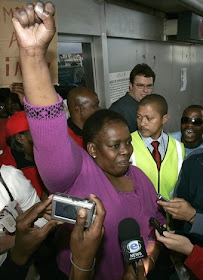Looming crisis: Food production has not kept pace with South Africa’s population growth
 SA becomes net importer of food as vast tracts of land lie fallow.
SA becomes net importer of food as vast tracts of land lie fallow.
South Africa’s food security is threatened by its chaotic rural land reform programme.
Thousands of once-productive farms, mainly in KwaZulu-Natal, Limpopo, Mpumalanga and Eastern Cape lie abandoned & causing serious shortages of staple foods.
The country now imports more food than it exports and local production of grain, fruit and vegetables can no longer keep pace with the growing population.
Uncertainty about South Africa’s land reform process — the authorities recently extended for the fourth time their deadline to finalise claims — has seen scores of commercial farmers stopping all investments in their properties. Others are leaving for more stable pastures, with many opting for Mozambique’s subtropical fruit and grain industry or stock farming in Botswana.
Although there have been success stories in land restitution, the process aimed to improve livelihoods has left scores of communities divided and in debt.
A private company appointed by the government as a strategic partner to provide management expertise for newly acquired restitution farms in Limpopo and Mpumalanga has collapsed, leaving beneficiaries owing millions in unpaid debt.
This week, the Land Claims Commission said an audit of the struggling projects has been concluded, but failed to provide specifics. But it did say the Department of Agriculture and Land Affairs would take the lead in the implementation of a “revival strategy”.
The new Land and Agrarian Reform Programme promises to put together support packages, employ project managers, engage strategic partners and landowners, procure investment and redesign farming operations.
On a two-week visit to farms around the country, the Sunday Times discovered that:
- Twenty top crop and dairy farms in the Eastern Cape, bought for R11.6-million and returned to a Kokstad community, are now informal settlements;
- A once-thriving potato farm in the KwaZulu-Natal Midlands is now a makeshift soccer field;
- Ten thousand people given back 8000ha of prime fruit and macadamia farms in Limpopo are crippled by R5-million debt;
- A former multimillion-rand tea estate in Magoebaskloof in Limpopo has become an overgrown forest;
- More than five tons of a macadamia nut crop on a reclaimed Limpopo farm was so poor that it was dumped into the Levubu river; and
- A R22-million irrigation system built by the government to supply water to new farmers in KwaZulu-Natal lies unused.
Ann Bernstein, executive director of the Centre for Development and Enterprise, a policy think-tank, said its research had shown that the economic viability of many rural regions was under serious threat. Some beneficiaries had no interest in farming but just wanted a secure place to stay, she said.
“The issue is that at least 50% of land reform projects have failed, and that means for many of the people involved their circumstances have not improved — and for some, have even got worse. And all this is happening in the midst of a rise in food prices,” Bernstein said.
AgriSA deputy president Dr Theo de Jager said the organisation was extremely concerned about collapsing farms.
He said “too many decision-makers” in each claimant community had made it difficult for commercial farmers to enter into agreed joint partnership ventures or mentoring programmes.
Andre Jooste, a senior manager at the National Agricultural Marketing Council, said they had seen a “relatively big increase” in the demand for food in the country. “The main concern with national food security is the fact that, since the early ’90s, the population has grown by 32% while overall agricultural production has only grown by 10%,” Jooste said.
“I think the failures we see in land reform was an opportunity missed to increase food supply in the country. Production has not kept up with population increases and that should be a serious concern to all role players.”
Food prices increased when there was restricted supply and big demand.
Professor Ben Cousins, director of the Programme for Land and Agrarian Studies at the University of the Western Cape, said the land reform process had not succeeded in improving people’s livelihoods.
“We’ve been measuring success in the wrong way by putting emphasis on speed in terms of meeting deadlines, which is counterproductive,” he said.
Despite a co-ordinated revival plan, acting chief land claims commissioner Andrew Mphela said it was too early to measure performance or to talk of failure. He said that contrary to “popular rhetoric and biased reporting from certain quarters”, projects did not collapse but instead experienced “challenges”.
 Mphela said most claims were only at an initial planning stage as far as post-settlement support was concerned.
Mphela said most claims were only at an initial planning stage as far as post-settlement support was concerned.He said the government’s policy envisaged a 10-year period for implementation after claims had been concluded.
Mphela described the Centre for Development and Enterprise as “self-proclaimed experts” whose claims were “baseless”, “frivolous” and “vexatious, if not outright mischievous”.
He said land reform was not a simple process. “There is a human development dimension to it. There is a cultural dimension to it, which is about constructing the human spirit which was destroyed over decades.
“It is precisely this culture of labour that was destroyed by apartheid in our people. In fact, it made them hate labour in all its forms because for them it was not voluntary. This aspect of land reform and restructuring of dignity is never understood.”



















